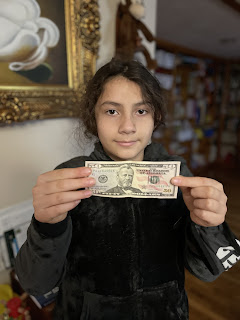For some reason, talking about finances is taboo in our culture. We've been taught not to share our salaries, our money problems, and disguise our lack of wealth with flashy name-brand purchases that supposedly afford us some sort of clout in society, even when we can't afford those items ourselves. Being poor is looked down upon, and being rich is the ultimate American Dream. But our capitalist society is built upon the poor making the rich richer, and there is no way we are going to be able to break through the glass ceiling of the American class system without explicit lessons on financial literacy.
Both my husband and I grew up poor, and we vowed that we didn't want to live that way as adults. We are not rich by any means, but we're solid working middle class, and we've been smart enough with our money since before we were married in 2014 to finance our wedding and buy a house in the same year, built my husband's business, and buy two rental properties.
But as millennial parents with three kids and substantial debt, we feel a heavy responsibility to teach our kids the financial lessons we had to learn through experience.
At two and four, the little ones are a bit young to have explicit financial lessons, but it begins by teaching them not to waste anything, and to take care of the toys, clothes, and things we have at home. We are careful to recycle anything we can, and we compost all our food waste. The adage "Waste not, want not" is trite, but it's our goal to instill in them the appreciation and value of the things we have--clothes, food, and toys.
Now at ten, the oldest one has had her fair share of financial lessons. We don't believe in an allowance or paying for chores, since doing chores and responsibilities are all a part of being a member of the household. Of course we make sure she has what she needs, but if she wants to buy something specific, she has to save birthday or Christmas money she gets from her family members. We also talk about the expenses of different items she wants, or things we buy, and we explain to her how we weigh our purchases. If she wants to buy something, I've shown her how to look online to see which store offers the best price, and I've also taught her to use coupons and discount codes whenever possible. We have taught her about minimum wage, and how many hours one would have to work to buy something (like an iPhone) and then we debate whether it is a reasonable purchase or not.
I've modeled for her financial reasoning, like I would pay one price for a certain item, but not a higher price. Or I ask her (or myself), "Is it something you need, or something you want?"
Just recently, we were talking to her about the process of refinancing our house, and the actual breakdown of a mortgage payment. We believe it is important to include our children in these conversations about finances from a young age, so that they have a realistic understanding of money and its importance and place in society.


Comments
Post a Comment